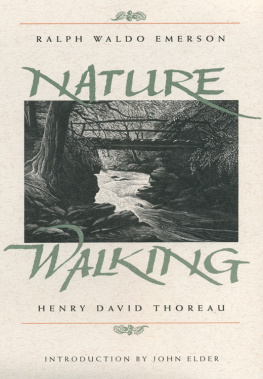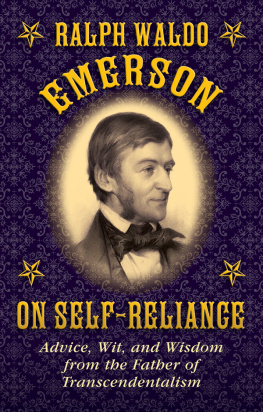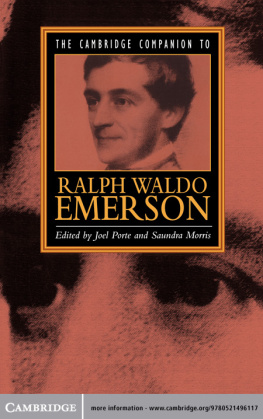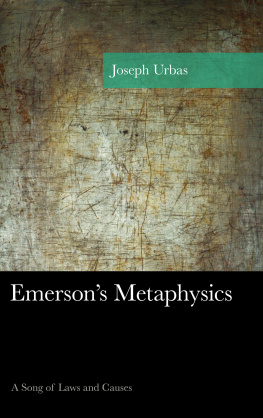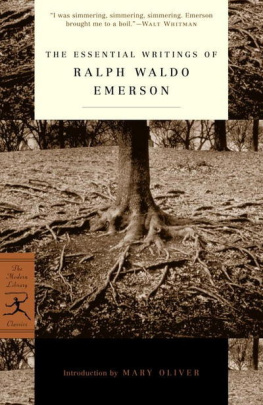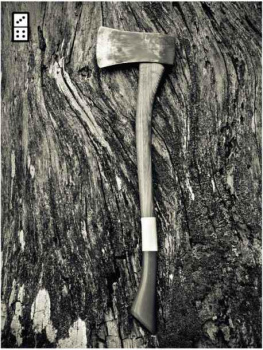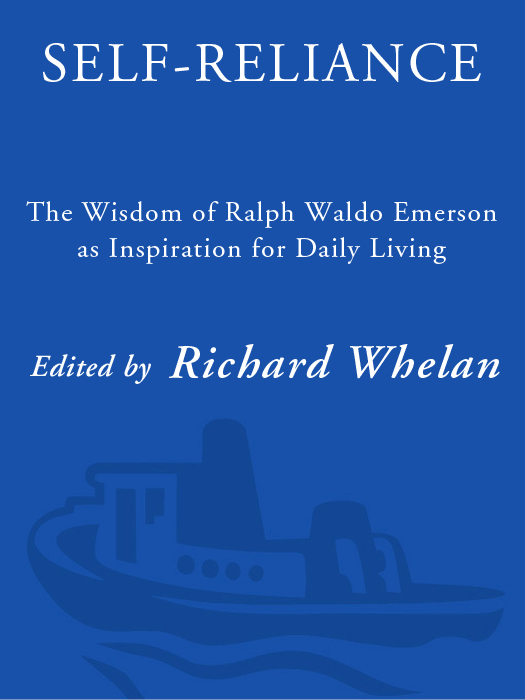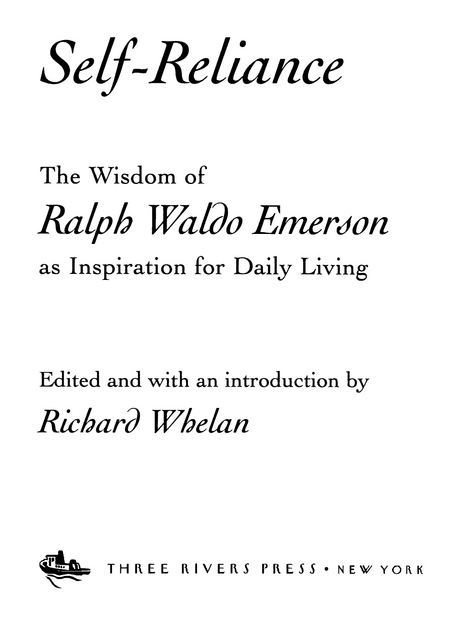Also by Richard Whelan
ANTHONY CARO (1974)
DOUBLE TAKE: A Comparative Look at Photographs (1981)
ROBERT CAPA: Photographs (edited with Cornell Capa) (1985)
ROBERT CAPA: A Biography (1985)
DRAWING THE LINE: The Korean War, 19501953 (1990)
CHILDREN OF WAR, CHILDREN OF PEACE: Photographs of Robert Capa (1991)
Copyright 1991 by Richard Whelan
All rights reserved.
Published in the United States by Three Rivers Press, an imprint of the Crown Publishing Group, a division of Random House, Inc. www.crownpublishing.com
Three Rivers Press and the Tugboat design are registered trademarks of Random House, Inc.
Originally published in the United States by Bell Tower, an imprint of the Crown Publishing Group, a division of Random House, Inc., in 1991.
Library of Congress Cataloging-in-Publication Data
Emerson, Ralph Waldo, 18031882.
Self-reliance : the wisdom of Ralph Waldo Emerson as inspiration for daily living/edited and with an introduction by Richard Whelan.
I. Whelan, Richard. II. Title.
PS1603.W43 1991 814.3dc20 91-11369
eISBN: 978-0-307-81679-5
v3.1
Contents
Ralph Waldo Emerson:
Biographical Note
RALPH WALDO EMERSON was born in Boston, Massachusetts, on May 25, 1803. His father, the Reverend William Emerson, who traced his descent from one of the Puritan founders of Concord, Massachusetts, was the Unitarian pastor of Bostons fashionable First Church. (As opposed to traditional Protestants, the Unitarians rejected the doctrine of the Holy Trinity; they believed that Jesus was sent by God but not that he actually was God. The Unitarians also rejected the Calvinist doctrine maintaining that many people are from birth destined for eternal damnation and that no efforts on their part could alter their fate.) Of the eight Emerson children, only fiveall of them boys, and one of them mentally handicappedsurvived infancy. Of these, RWE was the second oldest. Two of RWEs younger brothers would die in their twenties of tuberculosis.
In 1811, when RWE was only eight, his father died (apparently of stomach cancer, though possibly of tuberculosis). Since he left no estate of any consequence, his wife, Ruth Haskins Emerson, was faced with the task of raising five boys in genteel poverty. Although she was assisted financially by her late husbands congregation, she was forced to open a boardinghouse to make ends meet. She was joined as head of the household by William Emersons sister, Mary Moody Emerson, an eccentric and temperamental woman of passionately Calvinist religious convictions and practices.
From 1812 until 1817 RWE was a student at the Boston Public Latin School. In 1817, at the age of fourteen, he became the youngest member of the Harvard College class of 1821. He met his expenses by serving as the college presidents orderly, by waiting on tables in the college dining room, and by teaching at his uncle Samuel Ripleys school in Waltham during college vacations. Although RWE won second prizes for essays on Socrates and on ethical philosophy, his record at Harvard was undistinguished; he graduated thirtieth in a class of fifty-nine.
RWE had long intended to follow in his fathers footsteps and become a minister. However, circumstances forced him to postpone his enrollment at Harvard Divinity School for four years, during which time he taught in various secondary schools in and around Boston. Throughout that period, he was reading widely in religion and philosophy and was beginning to evolve the ideas that would be the basis for all of his later work.
RWE entered the Harvard Divinity School in 1825. Although eye troubles and rheumatism interrupted his studies, he had made sufficient progress by October 1826 to be granted an interim license to preach. The Reverend Ralph Waldo Emerson preached his first sermon that month, but almost at once he developed symptoms of tuberculosis. His uncle Samuel Ripley lent him money for a winter in Charleston, South Carolina, and St. Augustine, Florida.
Recovered, RWE returned to Boston in June 1827. He resumed his studies at Harvard and earned his living as an itinerant preacher, in which capacity he spent several weeks during December in Concord, New Hampshire. There the twenty-four-year-old RWE was captivated by a serious sixteen-year-old girl named Ellen Tucker, who was already pale from tuberculosis. Despite her illness, RWE became engaged to her the following December; they were married in September 1829. Earlier that year RWE had been ordained and was appointed junior pastor of the Second Church in Boston.
In February 1831, after only sixteen months of blissful marriage, Ellen Tucker Emerson died of tuberculosis. RWE, who had adored her and had greatly esteemed her spirituality, was devastated. The death of his angel led RWE to question everything, including his role as a minister, more strongly than ever. By the middle of 1832 he had decided that the sacrament of communion was without divine authorization or efficacy and that for him to continue to administer it as such would be hypocritical. Later that year, when his church rejected this position, he resigned from his pastorate and sailed for Europe. He spent much of 1833 visiting Malta, Sicily, Naples, Rome, Florence, Venice, Paris, and London. While in Britain, he managed to meet several of his literary and philosophical heroes: William Wordsworth, Samuel Taylor Coleridge, and Thomas Carlyle. He was disappointed by the first two, but he and Carlyle became lifelong friends.
Upon his return to Boston in October 1833, RWE resumed his old occupation of itinerant preacher; during the next few years he would deliver a sermon almost every Sunday somewhere in the Boston area, or even as far away as Plymouth or New Bedford. It was in Plymouth that he met a devout woman named Lydia Jackson (whom RWE always called Lidian). They were married in September 1835. A modest inheritance from his late wife enabled RWE to buy a house in Concord, Massachusetts, and provided him with a small annual income.
In November 1833, a month after his return from Europe, RWE delivered his first secular lecture, on The Uses of Natural History, to the Natural History Society in Boston. Beginning in 1835 he would read a new series of lectures to Boston audiences each winter. (He never extemporized, either in the pulpit or on the podium.) His lecture series dealt with such subjects as the lives of great men, English Literature, The Philosophy of History, Human Culture, Human Life, and The Present Age. As his reputation spread during the 1830s, he was invited to repeat these lectures in towns near Boston.
In 1836 RWE published, anonymously, his small book entitled Nature, in which he articulated his philosophy of nature as the embodiment of divine law. That same year RWEs wife gave birth to a son, whom they named Waldo (the name by which RWE himself preferred to be called).
Two years later RWE delivered an address at the Harvard Divinity School, a bastion of Unitarianism, in which he attacked the spiritual and intellectual laxness of most Unitarian ministers. He would be persona non grata at Harvard for thirty years. The storm raised by the address brought about RWEs final break from the Unitarian church.
In March 1841 RWEs first series of Essays was published in Boston. That spring RWE invited Henry David Thoreau, a twenty-four-year-old Concord neighbor, to move into the Emerson house as handyman and gardener, in payment for which duties he would receive room and board.


